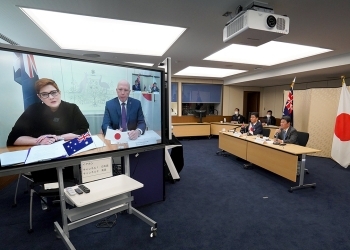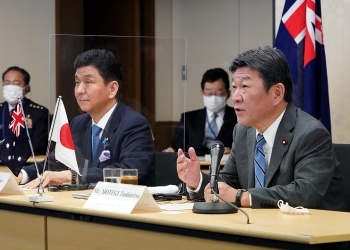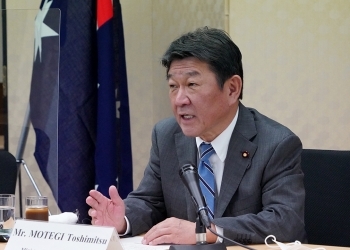Press Releases
Ninth Japan-Australia Foreign and Defence Ministerial Consultations (“2+2”)



On June 9, commencing at 11 a.m. for approximately 2 hours, Mr. MOTEGI Toshimitsu, Minister for Foreign Affairs of Japan, and Mr. KISHI Nobuo, Minister of Defense of Japan, held the ninth Japan-Australia Foreign and Defence Ministerial Consultations (“2+2”) via video conference with Senator the Hon Marise Payne, Minister for Foreign Affairs of the Commonwealth of Australia, and the Hon Peter Dutton MP, Minister for Defence of the Commonwealth of Australia. The overview of the consultations is as follows. (A joint statement was issued after the consultations.)
General outline
The four Ministers shared the view to deepen cooperation between Japan and Australia, “Special Strategic Partners” which share fundamental values and strategic interests, towards realizing a “Free and Open Indo-Pacific” amid the increasingly challenging security environment in the Indo-Pacific region. The Ministers also confirmed the importance of sharing their strategic awareness considering regional security challenges, and elevating security and defence cooperation between Japan and Australia to a new level so as to contribute to the peace, stability and prosperity of the Indo-Pacific and beyond, thereby realizing a “Free and Open Indo-Pacific.”
- (1) The four Ministers expressed serious concerns about the situation in the East China Sea and the South China Sea, and strongly opposed to unilateral attempts to change the status quo by force or coercion. The four Ministers also expressed concern over China’s Coast Guard Law. Furthermore, they confirmed the importance of the rules-based, free and open maritime order.
- (2) The four Ministers confirmed the importance of peace and stability across the Taiwan Strait and concurred to encourage the peaceful resolution of cross-Strait issues. In addition, the Ministers expressed serious concerns about the human rights situation in Hong Kong and the Xinjiang Uyghur Autonomous Region.
- (3) Concerning the situation in North Korea, the four Ministers confirmed that it is essential for the international community to work as one to ensure North Korea’s complete, verifiable, and irreversible dismantlement of all its weapons of mass destruction and ballistic missiles of all ranges, and concurred that Japan and Australia will continue to work together to ensure the full implementation of the United Nations Security Council resolutions, including measures against sanctions evasion by North Korea, such as illicit ship-to-ship transfers. The four Ministers also shared the view to continue to work closely together towards the immediate resolution of the abductions issue.
- (4) The four Ministers expressed grave concern about the situation in Myanmar and concurred that Japan and Australia will continue to coordinate to ensure that the “Five Point of Consensus,” agreed at the ASEAN Leaders’ Meeting on April 24, leads to concrete outcomes.
- (5) The four Ministers reaffirmed that ASEAN is a key to realizing a “Free and Open Indo-Pacific,” and that Japan and Australia will support its unity and centrality, as well as the ASEAN Outlook on the Indo-Pacific (AOIP).
Engagement and cooperation with the United States and other like-minded countries
The four Ministers welcomed the United States’ strong commitment to the Indo-Pacific region and reaffirmed their commitment to further strengthen trilateral cooperation with the United States, a common ally, to support the peace, stability and prosperity of the region. Furthermore, the Ministers concurred on the importance of Japan-Australia-U.S. and Japan-Australia-India-U.S. coordination for realizing a “Free and Open Indo-Pacific,” and shared the view to promote cooperation with like-minded countries including Southeast Asian, European, and Pacific Island countries.
Japan-Australia security and defence cooperation
- (1) The four Ministers confirmed that Japan and Australia will further strengthen security and defence cooperation, including practical cooperation between defence authorities for regional peace and stability, based on a shared strategic awareness between the countries. Furthermore, the Ministers confirmed that they will continue to enhance the interoperability of the forces of both countries, and conduct more complex and sophisticated bilateral exercises by the Japan Self-Defense Forces (JSDF) and the Australian Defence Force (ADF), including air-to-air refueling.
- (2) The four Ministers also discussed economic security issues, such as technology and supply chains, cyber security issues such as rule-making for cyber space, and security in outer space, such as the sustainable and stable use of outer space, and concurred to continue to deepen Japan-Australia cooperation in these fields.
- (3) The four Ministers reaffirmed the strategic significance of a reciprocal access agreement between Japan and Australia (“Japan-Australia RAA”), and concurred to accelerate efforts to address all outstanding tasks to sign the RAA at the earliest possible opportunity. Furthermore, the Ministers underscored the importance of ensuring the safety of JSDF and ADF assets, and, regarding the protection of the weapons and other equipment of the units of the ADF by the JSDF personnel under Article 95-2 of the JSDF Law, confirmed that the necessary framework has been created and that the JSDF is ready to provide protection under this Article upon request from the ADF, whenever the appropriate opportunity arises.
(Reference) Joint Statement (PDF)

